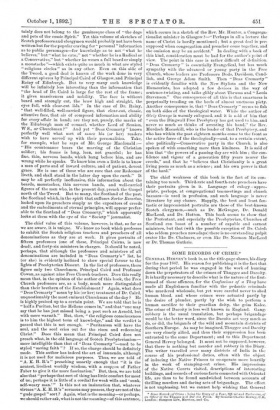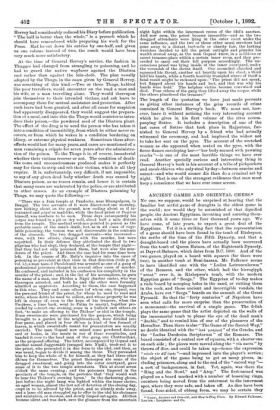SOME RECORDS OF CRIME.*
GENERAL HERVEY'S book is, as the title-page shows, his diary for the year 1867. His reason for publishing it is the fact that during that period he was engaged in the work of hunting down the perpetrators of the crimes of Thuggee and Dacoity. It is hardly necessary to describe what is the nature of the first- named of these offences, for the Confessions of a Thug have made all Englishmen familiar with the pedantic criminals who murdered wholesale, but yet were carefnl never to shed human blood, and whose crimes were actuated partly by the desire of plunder, partly by the wish to perform a human sacrifice to their guardian deity, the grim Kalee. The crime of Dacoity is less well known in England. Gang- robbery is the usual translation, but perhaps brigandage would be the better word, since the Dacoits act very much as do, or did, the brigands of the wild and mountain districts of Southern Europe. As may be imagined, Thuggee and Dacoity are very closely allied, and thus their suppression has been entrusted to the same Department; and to this Department General Hervey belonged. It must not be supposed, however, that there is nothing but murder and robbery in the Diary. The writer travelled over many districts of India in the course of his professional duties, often with the object of inducing the Native Princes to co-operate more heartily in the work of stamping-out crime. His impressions of the Native Courts visited, descriptions of interesting buildings, and records of carious facts connected with Oriental life, are thus to be found sandwiched between accounts of thrilling murders and daring acts of brigandage. The effect is not unpleasing, but we cannot help wishing that General • Some Record. of Crime being the Diary of a Year, Offi inl and Partieatar, of on Officer of the Thuggee a.d Dar.-,tie Pole.. By General Charles Hervey, CAL London : Sampson Low, Marston, and Co.
Hervey had considerably reduced his Diary before publication. " The half is better than the whole," is a proverb which he should have remembered while preparing his work for the Press. Had he cut down his entries by one-half, and given us one volume instead of two, the result would have been very much more satisfactory.
At the time of General Hervey's service, the fashion in Thuggee had changed from strangling to poisoning, and he had to guard the native wayfarer against the Dhatura root rather than against the loin-cloth. The plan usually adopted by the Thugs, in the cases given by General Hervey, was something of this kind :—Two or three Thugs, habited like poor travellers, would encounter on the road a man and his wife, or a man travelling alone. They would thereupon join themselves to their intended victims, and ask leave to accompany them for mutual assistance and protection. After such leave had been granted, and after all cause for suspicion had apparently disappeared, they would suggest the prepara- tion of a meal, and into this the Thugs would contrive to intro- duce their poison,—the powdered seed of the Dhatara plant. The effect of the drug is to send the person who has taken it into a condition of insensibility, from which he either never re- covers, or from which he wakes in a condition bordering on idiocy, or extreme physical weakness. Sometimes these after- effects would last for many years, and cases are mentioned of a man remaining a cripple for seven years after the administra- tion of the poison. To the Thugs it is, of course, immaterial whether their victims recover or not. The condition of death- like coma and unconsciousness produced makes it perfectly easy for them to strip and rob their victims, which is all they require. It is, unfortunately, very difficult, if not impossible, to say of any given dead body whether death was caused by Dhatura poison, as no traces remain, and hence it is certain that many cases are undetected by the police, or are attributed to other causes. As an example of Dhatura. poisoning by Thugs, we may quote the following :—
" There was a Jain temple at Pandooke, near Bhaugulpore, in Bengal. The two servants of it were discovered one morning, now kicking about on the ground, now reeling about as if in- toxicated and pagui or mad-like, while the head priest or Poojdree himself, was nowhere to be seen. Three days subsequently his corpse was found in a pit or dry well, about half a mile distant from the temple. The medical evidence pointed to poison as the probable cause of the man's death, but, as in all cases of vege- table poisoning, the venom was not discoverable in the contents of the stomach. The two drugged servants—who recovered— were, with two others, charged with the murder, but were acquitted. In their defence they attributed the deed to two pilgrims who had slept, they declared, at the temple that night— that they had not only poisoned them, but were also the mur- derers of the priest. And there the case had for some time been left. In the course of Mr. Reily's inquiries into the cases of poisoning so prevalent at that time in that direction (vide p. 38, vol. i.), a man named Phoolchund was arrested as one of a gang of professional poisoners charged in several other cases of murder. He confessed, and included in his confession his complicity in the murder of the priest ; and, in the list of his accomplices, he gave the name of a man, one Ph6doo a Nipit (barber caste), who was thereupon arrested, and both he and the other were formally admitted as approvers. According to them, the case happened in this wise. They and some others (of whom one, Gopaul, was the personal friend of the priest, for whom he used to read and write, whose debts he used to collect, and whose property he was left in charge of, even to the keys of his treasure, when the Poojdree, a time back, went to Patna to marry), together pro- ceeded by concert one evening, some in a bullock cart others on foot, `to make an offering to the Thdkoor' or idol in the temple. Some sweetmeats were purchased for the purpose, which being brought to a garden in the neighbourhood, were divided into four parts, and placed in four dhSnas (a kind of box formed of leaves, in which sweetstuffs meant for presentation are usually carried). The man Gopaul now mixed some powdered datoora seed or boobs', in the meats in one of those receptacles, and handed it over to the head man of the gang, one Chutturdhiri, as the proposed offering. The latter, accompanied by Gopaul and another named Juggurnith (escaped into Nipil), tendered it to the priest, who presented it in due form to the idol, and then, as was usual, began to divide it among the three. They persuaded him to keep the whole of it for himself, as they had three other dh6nas for themselves. The priest thereupon ate some of the drugged sweetmeat, and going into the outer courtyard, gave some of it to the two temple attendants. This at about seven o'clock the same evening ; and the poisoners lingered in the precincts of the temple, on the pretence that ' they would wait to hear the Thlikoor's evening hymn.' In the darkening gloom, just before the night lamp was lighted within the inner shrine, an aged woman, almost the last act of devotion of the closing day, crept in to be advised by the priest, and as silently stole away, and a lame old man struggled up to offer to the idol his obeisance and salutation, or durshun, and slowly limped out again. All then became silent and was dark, save the glimmer from the uncertain night light within the innermost recess of the idol's sanctum.. And now soon, the priest became insensible—and as the two drugged attendants were lying in the outer court under the same influence, and the two or three other usual servitors had gone away to a distant burt-mela or charity fair, the lurking wretches decided to kill the priest outright and plunder his wealth stowed away, as the man Gopaul knew, in a mdlkhana or secret treasure-place within a certain inner room, and they pro- ceeded to carry out their fell purpose accordingly. The un- conscious priest was lying inside of the inner courtyard, under the verandah of the shrine itself. One scoundrel clutched and squeezed his throat, another sat heavily upon his chest, a third held his hands, while a fourth horribly trampled where of itself a fatal result might be reckoned upon : The priest did not speak, but flapped about his hands and feet, and that was why his hands were held.' The helpless victim became convulsed and died. Four others of the gang then lifted away the corpse, while the others plundered the treasure."
The length of the quotation we have just made prevents us giving other instances of the grim records of crime contained in General Hervey's book. We must not, how- ever, leave it without noticing the very interesting account
which he gives in his first volume of the rites accom- panying Suttee. It includes a description of one of the
last cases of Suttee that took place in Rajputana, fur- nished to General Hervey by a friend who had actually witnessed the ceremony, and had implored the widow not to take her seat on the pyre. The account of the wretched woman as she appeared when seated on the pyre, with the fierce flames enveloping her—" her body seamed with yawning cracks "—is one of the most horrible things we have ever read. Another specially curious and interesting thing in General Hervey's book is his account of a tribe of pickpockets and sneak-thieves who only steal by day—between sunrise and sunset—and who would sooner die than do a criminal act by night. That is one of the strangest evidences that man must keep a conscience that we have ever come across.



































 Previous page
Previous page